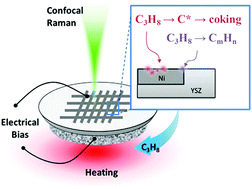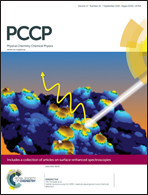An operando surface enhanced Raman spectroscopy (SERS) study of carbon deposition on SOFC anodes
Abstract
Thermally robust and chemically inert Ag@SiO2 nanoprobes are employed to provide the surface enhanced Raman scattering (SERS) effect for an in situ/operando study of the early stage of carbon deposition on nickel-based solid oxide fuel cell (SOFC) anodes. The enhanced sensitivity to carbon enables the detection of different stages of coking, offering insights into intrinsic coking tolerance of material surfaces. Application of a thin coating of gadolinium doped ceria (GDC) enhances the resistance to coking of nickel surfaces. The electrochemically active Ni–YSZ interface appears to be more active for hydrocarbon reforming, resulting in the accumulation of different hydrocarbon molecules, which can be readily removed upon the application of an anodic current. Operando SERS is a powerful tool for the mechanistic study of coking in SOFC systems. It is also applicable to the study of other catalytic and electrochemical processes in a wide range of conditions.

- This article is part of the themed collection: Surface-enhanced spectroscopies

 Please wait while we load your content...
Please wait while we load your content...